An octopus has 8 legs. Therefore, 5 octopuses have 5 times of 8 legs.
5 times 8 = 5 × 8 = 40
Therefore, 5 octopuses have 40 legs.
NCERT Solutions For Class 3 Maths Chapter 9 - How Many Times
How Many Times deals with the concept of multiplication. This chapter have exercises on multiplication of single digit numbers, table, missing numbers in multiplication problems, simple word problems on multiplication. The solutions for Math-Magic Chapter-9 have been created and verified by our experienced subject matter experts, according to the CBSE syllabus and guidelines of NCERT. For practice, our subject matter experts have created very interactive, activity-based, and Image-based worksheets on these topics to enhance learning.
Download PDF For NCERT Solutions for Maths How many times?
The NCERT Solutions For Class 3 Maths Chapter 9 - How Many Times are tailored to help the students master the concepts that are key to success in their classrooms. The solutions given in the PDF are developed by experts and correlate with the CBSE syllabus of 2025-2026. These solutions provide thorough explanations with a step-by-step approach to solving problems. Students can easily get a hold of the subject and learn the basics with a deeper understanding. Additionally, they can practice better, be confident, and perform well in their examinations with the support of this PDF.
Download PDF
Access Answers to NCERT Solutions For Class 3 Maths Chapter 9 - How Many Times
Students can access the NCERT Solutions For Class 3 Maths Chapter 9 - How Many Times. Curated by experts according to the CBSE syllabus for 2025–2026, these step-by-step solutions make Maths much easier to understand and learn for the students. These solutions can be used in practice by students to attain skills in solving problems, reinforce important learning objectives, and be well-prepared for tests.
Leggy Animals
So how many legs altogether do 5 octopuses have?

Are the groundnuts really more than the jaggery (gur) in weight or do they just look more?
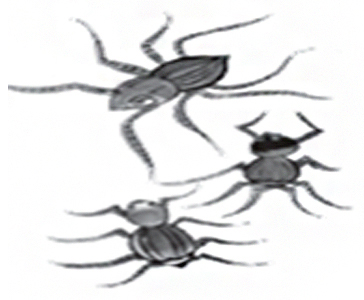
Since both the groundnuts, and the jaggery(gur) are 1 kg in weight, the groundnuts are not more than the jaggery in weight.
Find the Number without Counting
How many bottles are these?
__________ times_______ =_________ bottles
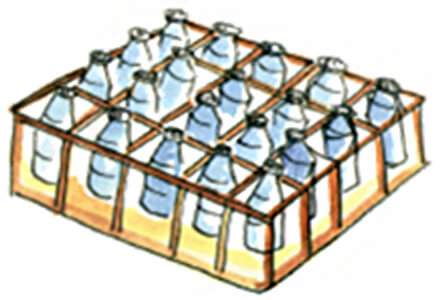
Since there are 5 rows of bottles and 4 bottles in each row, the total number of bottles are:
5 times 4 = 5 × 4 = 20 bottles
How many eggs?
_________times ______ = _______eggs
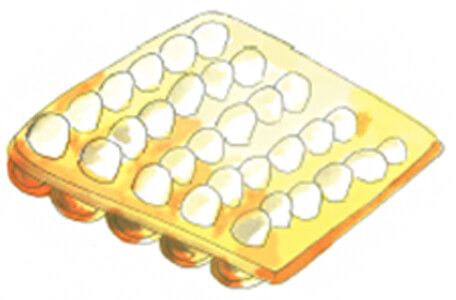
Since there are 6 rows of eggs and 5 eggs in each row,
5 times 6 = 5 × 6 = 30 eggs
Practice Time
Sabiha brought home 3 bunches of flowers. Each bunch has 4 flowers. How many flowers were there?
There are 4 flowers in a bunch, and you need to find the total number of flowers in 3 such bunches. Since
3 times 4 = 3 × 4 = 12,
there were 12 flowers.
One rail coach has 8 wheels. How many wheels in all in 6 coaches?
One coach has 8 wheels, and you need to find the total number of wheels in 6 such coaches. Since
6 times 8 = 6 × 8 = 48,
there 48 wheels in all.
Ramu bought 4 packets of biscuits. Each packet has 4 biscuits. How many biscuits did Ramu buy?
There are 4 biscuits in each packet, and you need to find the total number of biscuits in 4 such packets. Since
4 times 4 = 4 × 4 = 16,
he bought 16 biscuits.
Tell how many times!
8 + 8 + 8 =____× 8 =____
3 + 3 + 3 + 3 + 3 = 5 × ____= ____
30 + 30 + 30 =____ × ____ =____
7 + 7 + 7 + 7 + 7 + 7 = ____ ×____ =____
12 + 12 + 12 + 12 =____× 12 =____
6 + 6 + 6 =____×____ =____
10 + 10 + 10 + 10 = ____×____=_____
2 + 2 + 2 + 2 + 2 =_____×____=____
6 + 6 + 6 + 6 + 6 + 6 + 6 =_____×_____ =_____
The correct answers are:
8 + 8 + 8 = 3 × 8 = 24
3 + 3 + 3 + 3 + 3 = 5 × 3 =15
30 + 30 + 30 = 3 × 30 = 90
7 + 7 + 7 + 7 + 7 + 7 = 6 × 7 = 42
12 + 12 + 12 + 12 = 4 × 12 = 48
6 + 6 + 6 = 3 × 6 = 18
10 + 10 + 10 + 10 = 4 × 10 = 40
2 + 2 + 2 + 2 + 2 = 5 × 2 = 10
6 + 6 + 6 + 6 + 6 + 6 + 6 = 7 × 6 = 42
Rewrite using the + sign.
2 × 5 is 2 times 5 or 5 + 5
4 × 18 is 4 times ________or _____+_____+_____+_____
3 × 20 is_____times_____or_____+_____ +_____
8 × 9 is_____times_____or_____ +_____+_____ +_____+_____
+_____+_____
The correct answers are:
4 × 18 is 4 times 18 or 18 + 18 + 18 + 18 = 72
3 × 20 is 3 times 20 or 20 + 20 + 20 = 60
8 × 9 is 8 times 9 or 9 + 9 + 9 + 9 + 9 + 9 + 9 + 9 = 72
There are 12 desks in a classroom. Each desk has 4 legs. What is the total number of legs of the desks?
A desk has 4 legs, and you need to find the total number of legs in 12 such desks. Since
12 times 4 =12 × 4 = 48,
The total number of legs are 48.
How Many Times 2?
4 times 2 is____or 4 × 2 =____
times 2 is____or 5 × 2 =____
6 times 2 is____ or 6 × 2 =____
____times 2____is or____× 2 =____
____times ____is____ or 8 × 2 =____
____times____is or 9 × 2 =____
____times____is or 10 × 2 =____
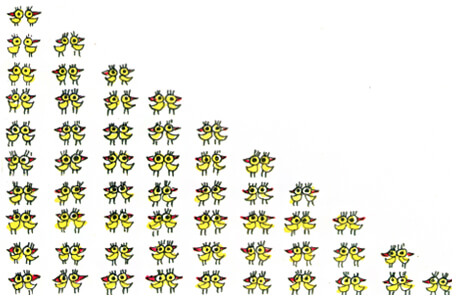
The correct answers are:
4 times 2 is 8 or 4 × 2 = 8
5 times 2 is 10 or 5 × 2 = 10
6 times 2 is 12 or 6 × 2 = 12
7 times 2 is 14 or 7 × 2 = 14
8 times 2 is 16 or 8 × 2 = 16
9 times 2 is 18 or 9 × 2 = 18![]()
10 times 2 is 20 or 10 × 2 = 20![]()
Jump with Me
Tarru the Frog jumps 3 steps each time. Which numbers will Tarru touch?
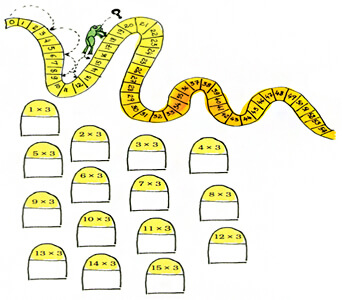
The correct answer is:
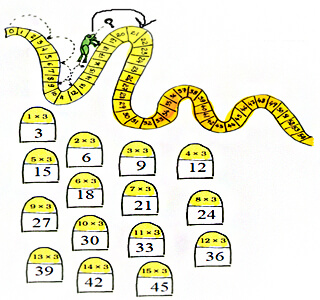
Show jumps with 4 steps
Fill in the blanks
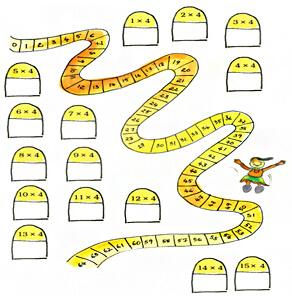
Answers may vary.
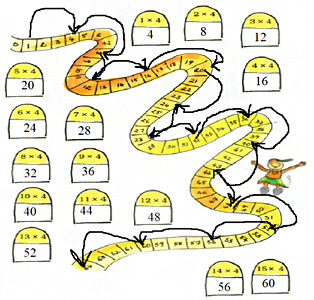
Try jumps with seven steps
Fill in the blanks
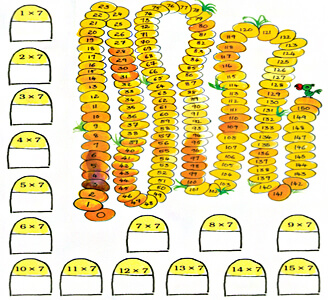
The correct answer is:
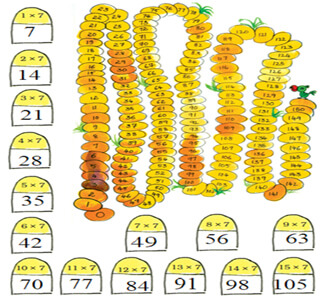
Stick Play
Now draw sticks to make the multiplication table of 6:
Draw by yourself.
1 × 6 = 6
2 × 6 = 12
3 × 6 = 18
4 × 6= 24
5 × 6 = 30
6 × 6 = 36
7 × 6 = 42
8 × 6 = 48
9 × 6 = 54
10 × 6 = 60
Let's try making a 2 times table with sticks:
1 × 2 = 2
2 × 2 = 4
3 × 2 = 6
4 × 2 =
5 × 2 =
6 × 2 =
7 × 2 =
8 × 2 =
9 × 2 =
10 × 2 =
The correct answer is:
1 × 2 = 2
2 × 2 = 4
3 × 2 = 6
4 × 2 = 8
5 × 2 = 10
6 × 2 = 12
7 × 2 = 14
8 × 2 = 16
9 × 2 = 18
10 × 2 = 20
Shopping with Tables
5 toys cost____rupees.
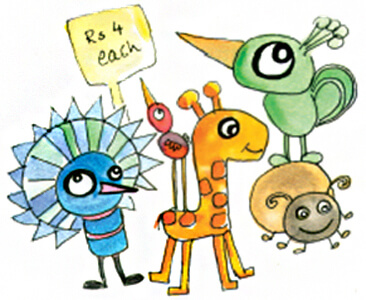
Since the cost of one toy is Rs 4, multiply 5 by 4 to get the cost of 5 toys.
5 × 4 = 20
Therefore, the cost of 5 toys is Rs 20.
7 face masks____cost rupees

Since the cost of one mask is Rs 3, multiply 7 by 3 to get the cost of 7 masks.
7 × 3 = 21
Therefore, the cost of 7 masks is Rs 21.
9 balloons cost____ rupees.
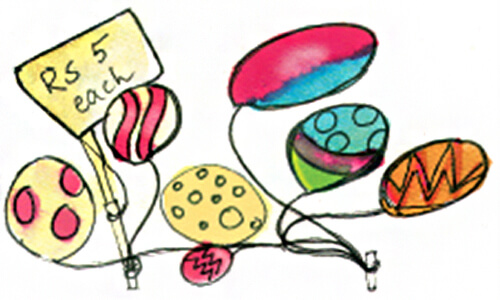
Since the cost of one balloon is Rs 5, multiply 9 by 5 to get the cost of 9 balloons.
9 × 5 = 45
Therefore, the cost of 9 balloons is Rs 45.
How much do these things cost?
4 toffees cost____rupees. [Hint: 4 × 2].
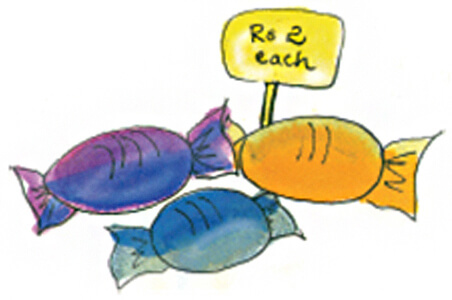
Since the cost of one toffee is Rs 2, multiply 4 by 2 to get the cost of 4 toffees.
4 × 2 = 8
Therefore, the cost of 4 toffees is Rs. 8.
a) 3 pencil boxes cost____rupees.
b) 10 pencil boxes cost____rupees.
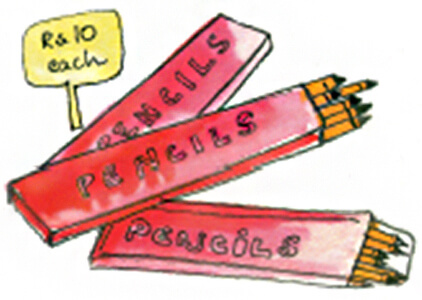
a) Since the cost of one pencil box is Rs 10, multiply 3 by 10 to get the cost of 3 pencil boxes.
3 × 10 = 30
Therefore, the cost of 3 pencil boxes is Rs 30.
b) Multiply 10 by 10 to get the cost of 10 pencil boxes.
10 × 10 = 100
Therefore, the cost of 10 pencil boxes is Rs 100.
How many in all?
Some multiplication facts:
a) 8 × 3 = ___ b) 5 ×___= 35
c) 3 ×___ = __ d) ___× 6 = 36
e)___×___= 42 f) 10 ×____=___
g) 5 ×___ = 40 h) ___× 9 = 36
i)___×___= 54 j) ____ × 7 = 28
The correct answers are:
a) 8 × 3 = 24
b) 5 × 7 = 35
c) 3 × 4 =12 (Answers may vary)
d) 6 × 6 = 36
e) 7 × 6 = 42 (Answers may vary)
f)10 × 7 =70 (Answers may vary)
g) 5 × 8 = 40
h) 4 × 9 = 36
i) 6 × 9 = 54(Answers may vary)
j) 4 × 7 = 28
A shirt has 5 buttons. How many buttons would 3 shirts have?
There are 5 buttons in one shirt. To find the total number of buttons in 3 such shirts multiply 5 by 3.
5 × 3 = 15
Therefore, there would be a total of 15 buttons in 3 such shirts.
There are four fans. Each fan has 3 blades. What is the total number of blades in all?
There are 3 blades in one fan. To find the total number of blades in 4 such fans, multiply 4 by 3.
4 × 3 = 12
Therefore, there are a total of 12 blades.
A box contains 6 apples. How many apples in all will seven boxes have?
There are 6 apples in one box. To find the total number of apples in7 such boxes multiply 7 by 6.
7 × 6 = 42
Therefore, there are 42 apples altogether.
The almirah has 4 shelves. There are 5 books in each shelf. How many books are in the almirah?
Since there are 5 books on each shelf, to find the total number of books in 4 such shelves multiply 4 by 5.
4 × 5 = 20
Therefore, there are a total of 20 book
How many corners would 4 triangles have?
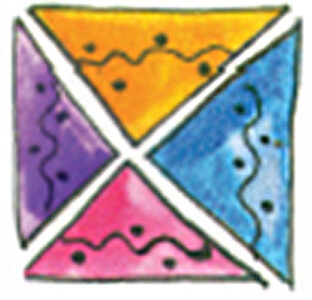
Observe the given picture. There are 3 corners in one triangle. To find the total number of corners in 4 triangles, multiply 4 by 3.
4 × 3 = 12
Therefore, there are 12 corners.
Multiplication Patterns
9 × 1 = 9
9 × 2 = 18 1 + 8 = 9
9 × 3 = 27 2 + 7 = 9
9 × 4 = 36 3 + 6 = 9
9 × 5 = 45 4 + 5 = 9
9 × = + = 9 × = + = 9 × 8 = + =
Observe the pattern in multiplication of 9. The correct answer is: 9 × 1 = 9 9 × 2 = 18 1 + 8 = 9 9 × 3 = 27 2 + 7 = 9 9 × 4 = 36 3 + 6 = 9 9 × 5 = 45 4 + 5 = 9 9 × 6 = 54 5 + 4 = 9 9 × 7 = 63 6 + 3 = 9 9 × 8 =72 7 + 2 = 9
Look for other such crosses and copy them in your notebook.
Do it by yourself. Answers may vary. Following is a sample answer.
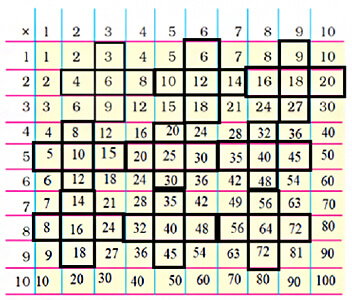
Complete the grid by multiplying the numbers
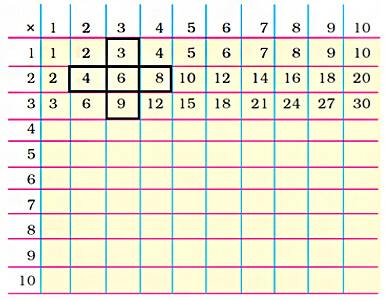
The correct answer is:
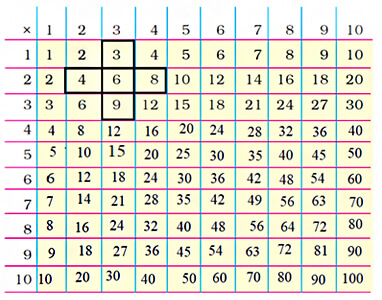
Practice Time
AA. Multiply:
a) 22 × 3 = b) 43 × 2 =
c) 21 × 4 = d) 24 × 2 =
e) 11 × 5 = f) 30 × 5 =
g) 20 × 4 = h) 23 × 9 =
i) 26 × 4 j) 38 × 2 =
k) 25 × 3 = l) 24 × 5 =
m) 35 × 3 = n) 48 × 4 =
o)32 × 5 = p) 58 × 2 =
The correct answers are:
a) Split 22 in 20 and 2, and then multiply these numbers by 3 as:
| 1 | 20 | 2 |
|---|---|---|
| 3 | 20X3 | 2X3 |
| 60 | 6 |
60 + 6 = 66
Therefore, 22 × 3 = 66
b) Split 43 in 40 and 3, and then multiply these numbers by 2 as:
| 1 | 40 | 3 |
|---|---|---|
| 2 | 40X2 | 3X2 |
| 80 | 6 |
80 + 6 = 86
Therefore, 43 × 2 = 86
c) Split 22 in 20 and 2, and then multiply these numbers by 3 as:
| 1 | 20 | 1 |
|---|---|---|
| 4 | 20X4 | 1X4 |
| 80 | 4 |
80 + 4 = 84
Therefore, 21 × 4 = 84
d) Split 24 in 20 and 4, and then multiply these numbers by 2 as:
| 1 | 20 | 4 |
|---|---|---|
| 2 | 20X2 | 4X2 |
| 40 | 8 |
40 + 8 = 48
Therefore, 24 × 2 = 48
e) Split 11 in 10 and 1, and then multiply these numbers by 5 as:
| 1 | 10 | 1 |
|---|---|---|
| 5 | 10X5 | 1X5 |
| 50 | 5 |
50 + 5 = 55
Therefore,11 × 5 = 55
f) 30 × 5 = 150
g) 20 × 4 = 80
h) Split 23 in 20 and 3, and then multiply these numbers by 9 as:
| 1 | 20 | 3 |
|---|---|---|
| 9 | 20X3 | 2X3 |
| 180 | 27 |
180 + 27 = 207
Therefore, 23 × 9 = 207
i) Split 26 in 20 and 6, and then multiply these numbers by 4 as:
| 1 | 20 | 6 |
|---|---|---|
| 4 | 20X4 | 6X4 |
| 80 | 24 |
80 + 24 = 104
Therefore, 26 × 4 = 104
j) Split 38 in 30 and 8, and then multiply these numbers by 2 as:
| 1 | 30 | 8 |
|---|---|---|
| 2 | 30X2 | 8X2 |
| 60 | 16 |
60 + 16 = 76
Therefore, 38 × 2 = 76
k) Split 25 in 20 and 5, and then multiply these numbers by 3 as:
| 1 | 20 | 5 |
|---|---|---|
| 3 | 20X3 | 5X3 |
| 60 | 15 |
60 + 15 = 75
Therefore, 25 × 3 = 75
l) Split 24 in 20 and 4, and then multiply these numbers by 5 as:
| 1 | 20 | 4 |
|---|---|---|
| 5 | 20X5 | 4X5 |
| 100 | 20 |
100 + 20 = 120
Therefore, 24 × 5 = 120
m) Split 35 in 30 and 5, and then multiply these numbers by 3 as:
| 1 | 30 | 5 |
|---|---|---|
| 3 | 30X3 | 5X3 |
| 90 | 15 |
90 + 15 = 105
Therefore, 35 × 3 = 105
n) Split 48 in 40 and 8 and then multiply these numbers by 4 as:
| 1 | 40 | 8 |
|---|---|---|
| 4 | 40X4 | 8X4 |
| 160 | 32 |
160 + 32 = 192
Therefore, 48 × 4 = 192
o) Split 32 in 30 and 2, and then multiply these numbers by 5 as:
| 1 | 30 | 2 |
|---|---|---|
| 5 | 30X5 | 2X5 |
| 150 | 10 |
150 + 10 = 160
Therefore, 32 × 5 =160
p) Split 58 in 50 and 8, and then multiply these numbers by 2 as:
| 1 | 50 | 8 |
|---|---|---|
| 2 | 50X2 | 8X2 |
| 100 | 16 |
100 + 16 = 116
Therefore, 58 × 2 = 116
22× 3 = 66
First guess the answer and then calculate:
a) A flower has five petals. A bunch of flowers have 13 flowers. How many petals are there in the bunch?
b) A book has 64 pages. What will be the total number of pages in 8 such books?
c) Students stand in rows in the assembly. There are six rows of students. Each row has 17 students. How many students are there?
d) A design has 3 flowers in it. A piece of cloth has 17 such designs. How many flowers will be on the cloth?
Guess the answers by yourself.
a) There are 5 petals in one flower. Since there are 13 flowers in a bunch, multiply 13 by 5 to get the total number of petals in the bunch.
13 × 5 = 65
Therefore, there are 65 petals in the bunch.
b) There are 64 pages in one book. To find the total number of pages in 8 such books, multiply 8 by 64 as:
| 60 | 4 | |
|---|---|---|
| 8 | 60X8 | 4X8 |
| 480 | 30 |
480 + 32 = 512
Therefore, 64 × 8 = 512
Hence, there are 512 pages in total.
c) There are 17 students in one row. To find the number of students in 6 such rows, multiply 17 by 6 as:
| 10 | 7 | |
|---|---|---|
| 6 | 10X6 | 7X6 |
| 60 | 42 |
60 + 42 = 102
Therefore, 17 × 6 = 102
Hence, there are 102 students.
d) There are 3 flowers in one design. To find the total number of flowers in 17 such designs, multiply 17 by 3 as:
| 10 | 7 | |
|---|---|---|
| 3 | 10X3 | 7X3 |
| 30 | 21 |
30 + 21 = 51
Therefore, 17 × 3 = 51
Hence, there will be 51 flowers.
Practice Time
First guess the answer and then check it by calculating:
a) 42 × 23 = b) 73 × 11 =
c) 51 × 13 = d) 54 × 12 =
e) 25 × 36 = f) 12 × 14 =
Guess the answer on your own.
a) Split the numbers and multiply as:
42 = 40 + 2, and 23 = 20 + 3
| 40 | 2 | |
|---|---|---|
| 20 | 40 × 20 = 800 | 2 × 20 = 40 |
| 3 | 40 × 3 = 120 | 2 × 3 = 6 |
| Total=800+120= 920 | Total = 46 |
920 + 46 = 966
Therefore, 42 × 23 = 966
b) Split the numbers and multiply as:
73 = 70 + 3, and 11 = 10 + 1
| 70 | 3 | |
|---|---|---|
| 10 | 70 × 10 = 700 | 3 × 10 = 30 |
| 1 | 70 × 1 = 70 | 3 × 1 = 3 |
| Total=700 + 70= 770 | Total = 33 |
770 + 33 = 803
Therefore, 73 × 11 = 803
c) Split the numbers and multiply as:
51 = 50 + 1, and 13 = 10 + 3
| 50 | 1 | |
|---|---|---|
| 10 | 50 × 10 = 500 | 1 × 10 = 10 |
| 3 | 50 × 3 = 150 | 1 × 3 = 3 |
| Total=500+150= 650 | Total = 13 |
650 + 13 = 663
Therefore, 51 × 13 = 663
d) Split the numbers and multiply as:
54 = 50 + 4, and 12 = 10 + 2
| 50 | 4 | |
|---|---|---|
| 10 | 50 × 10 = 500 | 4 × 10 = 40 |
| 2 | 50 × 2 = 100 | 4 × 2 = 8 |
| Total=500+100= 600 | Total = 48 |
600 + 48 = 648
Therefore, 54 × 12 = 648
e) Split the numbers and multiply as:
25 = 20 + 5 and 36 = 30 + 6
| 10 | 5 | |
|---|---|---|
| 30 | 20 × 30 = 600 | 5 × 30 = 150 |
| 6 | 20 × 6 = 120 | 5 × 6 = 30 |
| Total=600+120= 720 | Total =150 + 30=180 |
720 + 180 = 900
Therefore, 25 × 36 = 900
f) Split the numbers and multiply as:
12 = 10 + 2 and 14 = 10 + 4
| 10 | 2 | |
|---|---|---|
| 10 | 110 × 10 = 100 | 2 × 10 = 20 |
| 4 | 10 × 4 = 40 | 2 × 4 = 8 |
| Total=100 + 40= 140 | Total = 28 |
So, 140 + 28 = 168
Therefore, 12 × 14 = 168
Practice Time
Complete the multiplication tree.
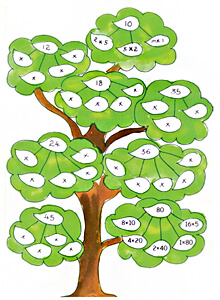
The correct answer is:
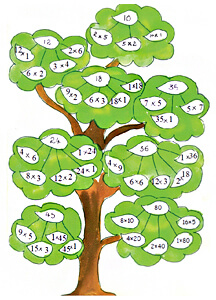
Look at the patterns and complete them.
a) 3, 6, 9, ____, ____, ___ .
b) 2, 4, 6, ____, ____, ____.
c) 10, 20, 30, ____, ___ , ____.____.
d) 4, 8, 12, ____, ___ , ____ .
e) 5, 10, 15, _____,______,____ .
f) 30, 60, 90,_____, _____, .
a) Observe the given pattern, the numbers are from the table of 3.
1 × 3= 3, 2 × 3 = 6, 3 × 3 = 9, 4 × 3 = 12, 5 × 3 = 15, 6 × 3 = 18
Therefore, the complete pattern is:
3, 6, 9, 12, 15, 18.
b) Observe the given pattern, the numbers are from the table of 2.
1 × 2 = 2, 2 × 2 = 4, 2 × 3 = 6, 2 × 4 = 8, 2 × 5 = 10, 2 × 6 = 12
Therefore, the complete pattern is:
2, 4, 6, 8, 10, 12.
c) Observe the given pattern, the numbers are from the table of 10.
1 × 10 = 10, 2 × 10 = 20, 3 × 10 = 30, 4 × 10 = 40, 5 × 10 = 50, 6 × 10 = 60
Therefore, the complete pattern is:
10, 20, 30, 40, 50, 60.
c) Observe the given pattern, the numbers are from the table of 4.
1 × 4 = 4, 2 × 4 = 8, 3 × 4 = 12, 4 × 4 = 16, 5 × 4 = 20, 6 × 4 = 24
Therefore, the complete pattern is
4, 8, 12, 16, 20, 24.
d) Observe the given pattern, the numbers are from the table of 5.
1 × 5 = 5, 2 × 5 = 10, 3 × 5 = 15, 4 × 5 = 20, 5 × 5 = 25, 6 × 5 = 30
Therefore, the complete pattern is
5, 10, 15, 20, 25, 30.
f) Observe the given pattern, the numbers are from the table of 30.
1 × 30 = 30, 2 × 30 = 60, 3 × 30 = 90, 4 × 30 = 120,
5 × 30 = 150, 6 × 30 = 180.
Therefore, the complete pattern is:
30, 60, 90, 120, 150, 180.
Multiplication Table of 1
one time one is 1 × 1 = 1
two times one is 2 × 1= 2
three times one is 3 × ___= __
four times one is __× __ = ___
____times one is __×___ = ___
____times one is ___× ___= ___
____times one is ___×___ = ___
____times one is ___× ___= ____
The correct answer is:
one time one is 1 × 1 = 1
two times one is 2 × 1 = 2
three times one is 3 × 1 = 3
four times one is 4 × 1 = 4
five times one is 5 × 1 = 5
six times one is 6 × 1 = 6
seven times one is 7 × 1 = 7
eight times one is 8 × 1 = 8

